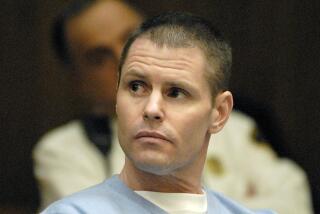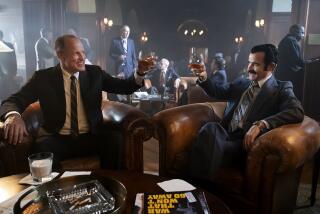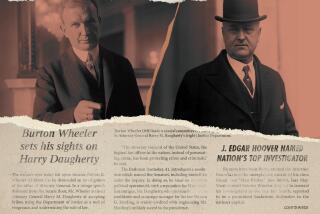Whitey Bulger: An American crime drama
- Share via
It is a story that has all the makings of an epic crime saga, so good it could be made into a movie. And it has been. And will be again. And so the story of Boston gangster James “Whitey” Bulger continues, with new chapters to be written even after the highly publicized capture, trial and imprisonment of a man now age 84.
The documentary “Whitey: United States of America v. James J. Bulger” uses Bulger’s 2013 trial in Boston on federal murder and racketeering charges as the lens through which to examine this enigmatic figure and self-styled folk legend who gave rides home to little old ladies and personally firebombed the birthplace of John F. Kennedy in 1975 to protest school busing.
“Whitey,” which opens in Los Angeles on Friday and is available on demand, has drawn harsh criticism — something to be expected with such a highly charged topic. Previously, Bulger was the loose inspiration for Jack Nicholson’s character in Martin Scorsese’s “The Departed” and will be portrayed by Johnny Depp in Scott Cooper’s film adaptation of the nonfiction book “Black Mass.”
Ben Affleck and Matt Damon also have been reported to have a Bulger movie in the works, and a separate Bulger-related television project based on the memoir of a former associate is planned as well. A shelf-full of books have been written about Bulger, some by criminals who rode alongside him and others by former law enforcement officials who chased after him.
Bulger makes for a dense, tantalizing tale. His younger brother Bill Bulger rose to be a powerful state politician. It is said that James Bulger’s long, brutal reign over the underworld of Boston was enabled by information he traded as an FBI informant before he vanished one step ahead of arrest. He was finally captured in 2011 in a nondescript Santa Monica apartment complex where he had been living with his girlfriend for most of his 16 years as a fugitive.
Oscar-nominated filmmaker Joe Berlinger has long grappled with issues of wrongdoing in the justice system, in “Brother’s Keeper,” “Crude,” the “Paradise Lost” trilogy and his recent television series “The System.” So this subject seems unusual for a filmmaker better known for defending innocent underdogs.
“It’s an irresistible story, a guy at the top of the criminal underworld for 25 years who never got so much as a traffic ticket,” said Berlinger in Los Angeles. “As a storyteller, a media maker, I have long been fascinated not just by his story, but I have never seen a contemporary criminal so pass into the cultural myth-making apparatus the way Bulger has.”
“Whitey” is the fastest turnaround he has ever had; shooting began in summer 2013, and the film premiered at the Sundance Film Festival in January. While the immense amount of material that already existed initially gave him pause, Berlinger came to realize how many shades of gray were unexplored.
“Here was an opportunity, despite the glut of media or even because of the glut of media that already exists, to separate the man from the myth,” said Berlinger, “an opportunity to try to understand how was Bulger able to operate, what made Bulger possible.”
Building up to the trial, Bulger’s attorneys stated he would testify in what promised to be an explosive tell-all of murder, extortion and corruption. After the judge disallowed the defense strategy of claiming Bulger was not an informant but did have an agreement of immunity, he did not take the stand. Convicted on 31 of 32 counts, found to have participated in 11 of the 19 murders he was accused of, Bulger was sentenced to two life terms plus five years.
David Boeri, who appears in “Whitey,” has covered the story for decades as a television journalist, radio reporter and author of “Bulger on Trial.” He noted that even if Bulger’s defense strategy was as “absurd” as many felt it was, it would still have forced open the trial to the larger issues that swirled around it.
Now, even with Bulger behind bars there remain unanswered questions about his relationship to the FBI. In an unlikely turn, the families of Bulger’s victims came during the trial to cheer on Bulger’s attorneys as they pressed government witnesses for details of the culture of corruption in which Bulger, in Boeri’s words, “was allowed to reign as a guy who could say, ‘I own this town.’
“It never ends because the stain, the original sin, has never been washed off,” Boeri said in an interview. “It’s never been rightly addressed. So it goes on and on. This was a dirty war, a war on organized crime in which the government was lawless.”
Within the thick brambles of Whitey-ology, what makes Berlinger’s film stand apart is that Bulger for the first time is heard to speak for himself. After the trial, Berlinger filmed Bulger’s attorney J.W. Carney Jr. making a phone call from his office to Bulger in prison.
In the hard-bitten squawk of a man who spent formative years in Alcatraz for bank robbery, Bulger declares himself “shocked” to discover a former close associate was an FBI informant. As for his own contested status as an informant, Bulger says to Carney, “I never cracked.”
Hank Brennan, co-lead defense attorney at Bulger’s trial and still Bulger’s lawyer, explained why they participated in Berlinger’s film when he said, “Joe stressed this was not going to be a piece that was going to advocate for Bulger or against him. It was going to recognize whatever the facts show. And that’s all we can want. We never took the position he was innocent, we weren’t looking to say something that wasn’t accurate, and we thought with Joe’s background and his commitment, we thought we’d at last get a fair opportunity to show the evidence.”
It is the inclusion of not just Bulger’s voice but the examination of his claims that has become a point of contention. The notion of Bulger as an informant acting with impunity has become a crucial part of the narrative around him, so his continued denials run counter to the accepted version of his story. “In some ways it’s the worst part of the movie,” said Boeri of Bulger’s protestations. “And yet it’s telling because you hear Bulger saying, as he always does, ‘I’m the victim.’”
Berlinger acknowledges that the compromised circumstances in which he got the Bulger conversation — he could not ask Bulger any questions — presented a dilemma. “I would rather have Bulger in the film in this format than not at all,” he said. “The aesthetic of the film is to raise troubling questions and to provoke further inquiry. It’s not to present the definitive truth. I’ve never made a film that presents such a multiplicity of viewpoints.”
For the way in which it considers the counter-narrative that Bulger might not have been an official FBI informant, perhaps the most outspoken critic of the film has been Boston journalist Kevin Cullen. Cullen was on the team of journalists who first reported Bulger as an FBI informant and co-wrote with Shelley Murphy the book “Whitey Bulger,” and he has recently written two columns in the Boston Globe about the film.
He charged that Berlinger “lends undeserved legitimacy to Whitey’s unsubstantiated claim that he wasn’t an informant. The film ignores much of the overwhelming evidence in the public record, and the resulting impression is so guileless and sympathetic to Whitey as to be disingenuous.”
And still the saga continues, with more twists. Brennan plans to file an appeal of Bulger’s conviction this summer. The man accepted as Bulger’s handler at the FBI, John Connolly, just saw his conviction in a 1982 Florida murder overturned.
“It churns on and on,” said Boeri. “There is no closure for the families, no sense of justice in the end. That’s what makes it outrageous. I’ve always seen this as a political corruption story rather than a simple crime story.
“I don’t think people outside the city understand how profound an influence he was. The FBI’s relationship with Bulger corrupted law enforcement, it corrupted city government, state government, state law enforcement, and it corrupted the culture and the media. So this whole town was corrupted on a massive level because of this relationship between the FBI and Bulger. It’s still not been fully brought into account.”
More to Read
Only good movies
Get the Indie Focus newsletter, Mark Olsen's weekly guide to the world of cinema.
You may occasionally receive promotional content from the Los Angeles Times.











